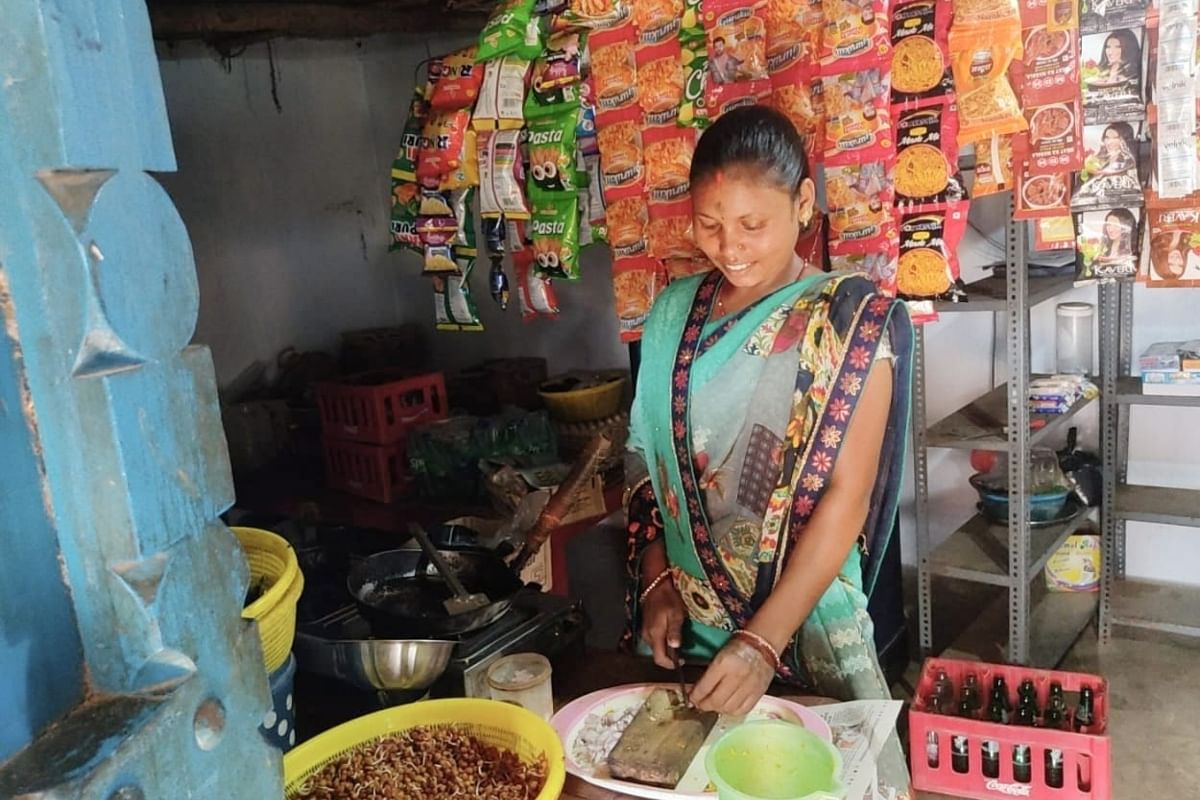Palamu, Saikat ChatterjeeMore than 1700 women in Palamu division have adopted alternative means of livelihood by joining Jharkhand government’s ambitious scheme Phulo Jhano Ashirwad Abhiyan. Identified women are getting interest free loans for livelihood enhancement. Due to this, she is joining respectable business leaving the business of selling bones and liquor. This is considered a positive initiative for Palamu division.
424 women gave up selling bone liquor in Palamu district
According to the official data, about 1770 women who were forced to manufacture and sell bone liquor in Palamu division have adopted alternative means of livelihood by joining Phulo Jhano Ashirwad Abhiyan. Of these, 424 women in Palamu district have left the business of selling bone liquor and adopted alternative means of livelihood. 965 women in Latehar district and 381 women in Garhwa district are associated with Phulo Jhano Ashirwad Abhiyan.
The condition of these women has improved in the society.
Not only has the respect of women increased by joining other work instead of selling bones and alcohol, but the respect of their family members has also increased in the society. Women who have left this business have now started considering it as a social evil. Where earlier she used to be almost ostracized in social events. She has now become a role model for the society.
the children of the house were also affected
The women said that the manufacture and sale of bone-daru used to trouble them and other family members were also affected. This had an adverse effect especially on children. When a relative used to come to the house, he had to feel ashamed. Due to economic constraints, they were forced to engage in such business, but by leaving it and adopting alternative means of livelihood, now the self-esteem in the village-society has increased.
Adopted this means of income by joining Sakhi Mandal
Women have adopted various means of livelihood by joining Sakhi Mandal and are earning well. Help has also been received from the government in generating new sources of livelihood. Under Phulo Jhano Ashirwad Abhiyan, an interest-free loan of Rs 10,000 is being made available to women for livelihood enhancement by connecting them with Sakhi Mandals, so that women can become self-reliant. By joining this campaign, women have adopted various means of employment.
Effect of Phulo Jhano Ashirwad campaign is visible
Some women are running a makeup shop, tea-dumplings, samosa shop, egg-omelet shop, while many women are involved in animal husbandry, goat rearing, poultry and duck rearing, and running their livelihood by joining agriculture work. Vimlesh Shukla, DPM of Jharkhand State Livelihood Promotion Society (JSLPS) said that women are doing better in the society with Phulo Jhano Ashirwad Abhiyan. Work is being done to speed it up.
20 women of the same village stopped making liquor and selling bones
There are more than 400 houses in Pidhiya village of Jhabar Panchayat of Medininagar Sadar block of Palamu. Majority of the families here belong to Oraon community. Once upon a time, a large quantity of bone liquor was available here. The women here are determined to change this situation and about 20 women have adopted other means of livelihood, completely abandoning the work of manufacturing and selling bone-daru. This has changed their social and economic condition. There is a weekly market in this village. Women decorate their shops all around the market. By earning from this, women are moving towards leading a happy life.
Self-reliant made of strong will
Prabhat Ranjan Pandey, community coordinator of JSLPS, who is motivating these women for a respectable life, said that it is a big deal for more than 20 women in the same village to leave the work of manufacturing and selling liquor. The women of the village, Aarti Devi, Parvati Devi, Manju Devi, Jasmatiya Devi, Revanti Devi, Suganti Devi, Soni Devi, Sakunta Devi, Lalita Devi, Rita Devi, Lakhpati Devi, Jhilo Devi, Vigni Devi, etc. have become self-sufficient with their strong will. . Other women are also being motivated to strengthen themselves financially by joining the campaign.
Boon Hai Phulo Jhano Ashirwad Abhiyan
Palamu Divisional Commissioner Manoj Jaiswal said that women should not be seen selling bones and liquor on the streets. Administrative efforts are being made for this. Under Phulo Jhano Ashirwad Abhiyan, work is being done to bring the women involved in the mainstream by connecting them with livelihood under Phulo Jhano Aashirwad Abhiyan. This campaign is a boon for the women selling bone liquor who want to leave this work.
what do women say
Soni Devi runs a makeup shop in Pidhiya village of Palamu. There is an egg-omelet shop in the empty spaces in front of the shop. 1000-1200 is earned daily from these shops. The profit in this is 250 to 300 rupees. With the income, she teaches children and runs the family. She told that she joined the Maa Shakti self-help group and opened a shop with an interest-free loan amount of Rs 10,000 received under Phulo Jhano Ashirwad Abhiyan.
women living a life of dignity
Sakunta Devi was struggling with poverty and financial crisis. Tried to adopt alternative means of employment by joining Godavari self-help group and started goat rearing. From three goats became 8 goats. In this, three goats were also sold for 10 thousand rupees. Presently there are five healthy goats, which is expected to generate 20 to 30 thousand income. Parvati Devi joins the Yamuna Milan self-help group and runs a chicken-meat shop. There is also a small grocery store as well. He said that self-respect has also been gained from this business. Manju Devi has become self-sufficient by joining the Jyoti group. Earlier, Manju used to earn from the manufacture and sale of bone liquor, but inspired by the officers of Jharkhand Livelihood Promotion Society (JSLPS) and the sisters of the group, she stopped the business of bone liquor. Now she buys and sells vegetables with the loan amount, which makes a good profit.

